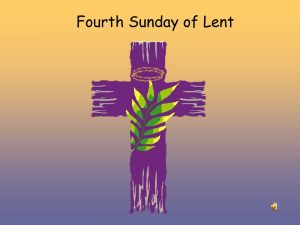 Notice the rose colored appointments in our chapel! It’s Laetare Sunday – a common name for this Fourth Sunday of Lent. The Latin word comes from the Entrance Antiphon which begins “Laetare, Jerusalem” (“Rejoice, O Jerusalem”). A little known custom for Laetare Sunday designates the day “Mothering Sunday”. But it is not a celebration of mothers (although many countries do fix their Mother’s Day celebrations on this day). It goes back to the 16th Century when it was common practice on the 4th Sunday of Lent for people to go “a-mothering” – to pay a visit to their “mother church” – the church of their baptism.
Notice the rose colored appointments in our chapel! It’s Laetare Sunday – a common name for this Fourth Sunday of Lent. The Latin word comes from the Entrance Antiphon which begins “Laetare, Jerusalem” (“Rejoice, O Jerusalem”). A little known custom for Laetare Sunday designates the day “Mothering Sunday”. But it is not a celebration of mothers (although many countries do fix their Mother’s Day celebrations on this day). It goes back to the 16th Century when it was common practice on the 4th Sunday of Lent for people to go “a-mothering” – to pay a visit to their “mother church” – the church of their baptism.
In England, Mothering Sunday was the only day during Lent when marriages could be celebrated. In the United States, domestic servants were usually given a day off to visit their mothers. Lenten fasting was relaxed and cakes were distributed to family members, giving rise to the name “Refreshment Sunday”. The name Rose Sunday stems from the color of the priest’s vestments – a muted lavender bringing out red tones.
Let’s turn to our Gospel reading of a young man’s “growing up” experience. It took moving away from home for this younger son to “come to himself.” Developmental psychologists tell us, and parents know, that some young people need to reject their conventional faith in order to come to their own faith. That reminds me of the story of Jesus straying from his parents after services in the temple in Jerusalem. [Or, I wonder, was it his parents who went off without him.] He was 12 now. He was a man. So he figured his parents would understand this “coming to himself” moment. Put another way, like the young man in the Gospel, they both “came to themselves” and were welcomed back into the security of loving parents.
At such times parents may feel like a failure. But let’s turn it around – it can be viewed as a success. They’ve given the young person the confidence, and enough rope, to leave home, to spread their wings and find their own faith. You’ve probably heard the saying: “If you love something set it free, if it returns it was meant to be; if it continues to fly, let it soar. Have faith that God has something better in store.”
The gospel suggests that the parent was his look-out for the wandering child, daily scanning the horizon (or FaceBook, Tik Tok, Instagram and YouTube) hoping against hope for a sign of their child. Upon sighting their child, the parent’s heart is “filled with compassion” and, in the case of our Gospel story, rushes out to welcome the one for whom they have yearned and prayed. “Prodigals” of all ages need to know that, like the heart of God, we are hoping for their return and that they will always be welcome home – with open arms.
Our Gospel shows us the difference between “coming home” and a “home-coming.” The son approached in fear and trepidation; the parent flung aside any resentment and ill-will. The young man was coming home to he knew-not-what kind of a reception. This parent threw a spontaneous homecoming party! And, welcomed and embraced the Prodigal almost before he could utter his rehearsed apology. What a picture of unconditional love!
trepidation; the parent flung aside any resentment and ill-will. The young man was coming home to he knew-not-what kind of a reception. This parent threw a spontaneous homecoming party! And, welcomed and embraced the Prodigal almost before he could utter his rehearsed apology. What a picture of unconditional love!
It doesn’t matter if prodigals don’t return to our particular expression of faith within God’s family. We pray that the good values that were instilled and modeled for them over the years – will sustain their journey, whatever road they take. And, we pray that we remember: true “for-giveness” is present long before the embrace of their homecoming. The waiting father, the renegade son and the “look at how good I have been” son … all knew peace at the end of the day.
We believe Benedict when he says that seeking peace is the way to heaven – heaven in the after-life and a little bit of heaven here on earth. In the Prologue to Benedict’s Rule we find the admonition: “seek PEACE and pursue it.” I like the translation that says “seek peace and go after it.” That conjures up quite an image… dashing out of the chapel, into the dining room, down the halls, out the door, into the neighborhoods, climbing God’s holy mountain pursuing PEACE – never abandoning charity nor giving a false peace.
 Let us each renew our commitment to make PEACE more than a concept that we talk about. Let us make a daily pledge to be people of peace, to be a peaceful people. Make each day an echo of what Paul tells us in the second reading: “The old things have passed away; behold new things have come…. We have been reconciled through Christ and (this is the punch line) WE HAVE BEEN GIVEN A MINISTRY OF RECONCILATION.”
Let us each renew our commitment to make PEACE more than a concept that we talk about. Let us make a daily pledge to be people of peace, to be a peaceful people. Make each day an echo of what Paul tells us in the second reading: “The old things have passed away; behold new things have come…. We have been reconciled through Christ and (this is the punch line) WE HAVE BEEN GIVEN A MINISTRY OF RECONCILATION.”
~ Reflection by Sister Roberta Bailey, OSB, Prioress


Leave a Reply